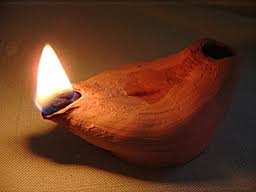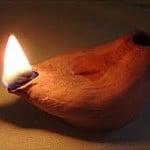Not just any oil was suitable for the Temple menorah. The Torah stipulates that the oil be particularly refined, made from hand- crushed olives, so that it will “raise up a constant flame” (Ex. 27:20).
Why this unusual phrase, ‘to raise up the flame’? Why not say simply, ‘to kindle the flame’?
Proper Oil and Wicks
The Sages explained that this expression indicates the quality of oil and wicks that are appropriate for the menorah. The oil must be pure, from types of oil that are absorbed easily by the wick. And the wicks must be of a material that burns smoothly. With such oil and wicks, the flame “raises itself up,” and does not need to be fiddled with. Therefore, the Torah says “to raise up a constant flame,” indicating that the light burns easily and naturally (Shabbat 21).
For Sabbath lights, the Sages similarly required that the oil be from a substance that is absorbed easily, and the wick be from a material that burns smoothly. “Those wicks and oils that the Sages disqualified from use on the Sabbath may also not be used in the Temple” (ibid.).
Metaphor for Body and Soul
Rav Kook explained that there is an inner significance to this law. The goal of the Sabbath is to perfect the individual, and the requirement for wicks and oil that light easily contains an important lesson about the proper path to perfection.
If the body is drawn exclusively towards physical pleasures, the intellect will not succeed in guiding it. One may become skilled in some craft or gain fluency in certain types of wisdom. But wisdom will not reside in the heart. The overriding tendency towards material pursuits will obstruct the illumination of the intellect.
Our body is like a wick. It must be refined so that it does not resist the light, but rather works together with the soul. Then it will be illuminated easily and evenly. This is the essence of the Sabbath day: a time set aside for harmonious living, so that we may naturally aspire to holiness and truth.
The oil is a metaphor for the mind. The human intellect also needs guidance; not every intellectual pursuit leads to ethical and spiritual growth. Cases abound of brilliant individuals who led corrupt lives. Just as the oil must be of a type that is readily absorbed by the wick, so too, the wisdom should be one that gives practical guidance towards proper living. Such is the wisdom of Israel, the Torah.
Lights of the Individual and the Nation
The Sabbath helps the individual grow spiritually. But what about the nation? What if the objective of the nation is to acquire riches and glory, regardless of any injustices performed along the way? Unfortunately, this is a common phenomenon: the individual pursues justice and goodness, while his country uses ruthless methods to attain its goals.
The heritage of the Jewish people, however, is different. Our national aspirations are at one with our individual aspirations. Both are rooted in the God’s law from Sinai. Both the individual and the community pursue the same goals of justice and mercy. This is the significance of connection made between the lights of the Sabbath and the Temple, thus linking together the individual and the nation. Both Sabbath and Temple lights must have oil and the wicks that light easily and smoothly. The wisdom of the nation, like that of the individual, must guide its actions effectively, and not be limited to some abstract intellectual pursuit.
Raising Itself Up
The Sages further explained that flame needs to be a constant light, one that “raises itself up.” What does this mean? Our impetus for seeking justice and good should be based on intrinsic, natural motives. This is accomplished by purifying the body through the sanctity of the practical mitzvot, and the mind through the light of Torah study. Then we do not need any artificial assistance to avoid evil. Our refined conscience will naturally lead us to the proper path.
(adapted from Ein Eyah vol. III, p. 57)
Copyright © 2006 by Chanan Morrison

